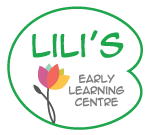At Lili’s Early Learning we believe our service plays an important role in meeting the nutritional needs of children whilst in our care.
We support breastfeeding. If a child is not breastfeeding, we will support appropriate formula/ bottle feeding strategies and we promote a child’s normal growth and development and also appropriate food choices and physical activity are encouraged.
Physical activity, combined with a nutritious, balanced food intake, contributes to a child’s health, well being and self esteem.
LEL provides breakfast, morning tea, lunch and afternoon tea. Filtered water is available to the children throughout the day.
Our daily menu includes the following five (5) food groups to provide a balanced diet
- BREAD & CEREALS (bread, cereals, rice, pasta, flour)
- FRUIT & VEGETABLES (oranges, apples, strawberries, carrots, pumpkin, tomatoes, broccoli, peas, beans)
- MEAT & PROTEIN (red meat, fresh fish, cheese, poultry, eggs, dried peas and beans)
- MILK & MILK PROD. (Milk, yoghurt, cheese, ricotta cheese
- FAT (butter, table margarine, oil, cream, dressings)
Drinks are provided with meals and throughout the day- these are water and milk.
Weekly menus are displayed on the notice board at reception.
We also cater for children with special dietary needs. Should your child be allergic to particular foods, simply fill in these details on the Enrolment form. Where children have food allergies confirmed by a medical practitioner, the centre will actively adhere to the medical recommendations, and ensure that it is communicated to those persons who directly care for the child.
Unfortunately, some children have a highly serious allergy to nuts and nut products. For this reason, we encourage our centre to be “nut free”, therefore we ask that parents respect this request and refrain from sending in any form of nut products into the centre. All food brought from home must be reported to staff and a “Food bought from home” form can be filled out.
Infants
Ensure bottles are clearly labeled. For mothers who are breast feeding, we have a freezer compartment in the babies’ room to store your milk. Please ensure that this is labeled and dated. All milk bottles brought to the centre must be placed in the fridge as soon as you arrive.
Children lead very active lives and they need a variety of nutritious foods for the growth and development of their minds and bodies. Concentration and learning are improved when children receive nutritional meals. To achieve this, it is essential that children are provided with food that offers the important nutrients that are needed.
Goal one
To provide an eating environment that is a positive experience for all children.
Strategies
Encourage children to help prepare the dining area.
Goal Two
To teach children about food and nutrition
Strategies
- Encourage children to get a hands-on experience in food preparation and cooking.
- During meal times discussions about the food the children are eating will take place.
- Food awareness activities will be included in the program.
Goal Three
To provide an eating environment that supports family and multicultural values.
Strategies
- Staff members will sit with the children at meal times and eat the same food.
- Recipes will be chosen from a variety of cultures.
- Children will be involved in the planning of food-related activities.
- Special occasions may be celebrated with culturally appropriate foods.
- The weekly menu will be on display to parents and staff.
Goal Four
To provide staff with professional development and training to ensure their knowledge about food and nutrition remains accurate and current.
Strategies
- Staff will be given opportunities annually to attend a professional development event on food and nutrition related issues.
- New staff will be orientated to the centre’s food and nutrition policies.
Staff will be asked for their input during review and redevelopment of the food and nutrition policy
Sourced: Education and Care Services National Regulation National Heart Foundation of Australia Staying healthy in child care – National Health and medical research centre Policy reviewed August 2017

